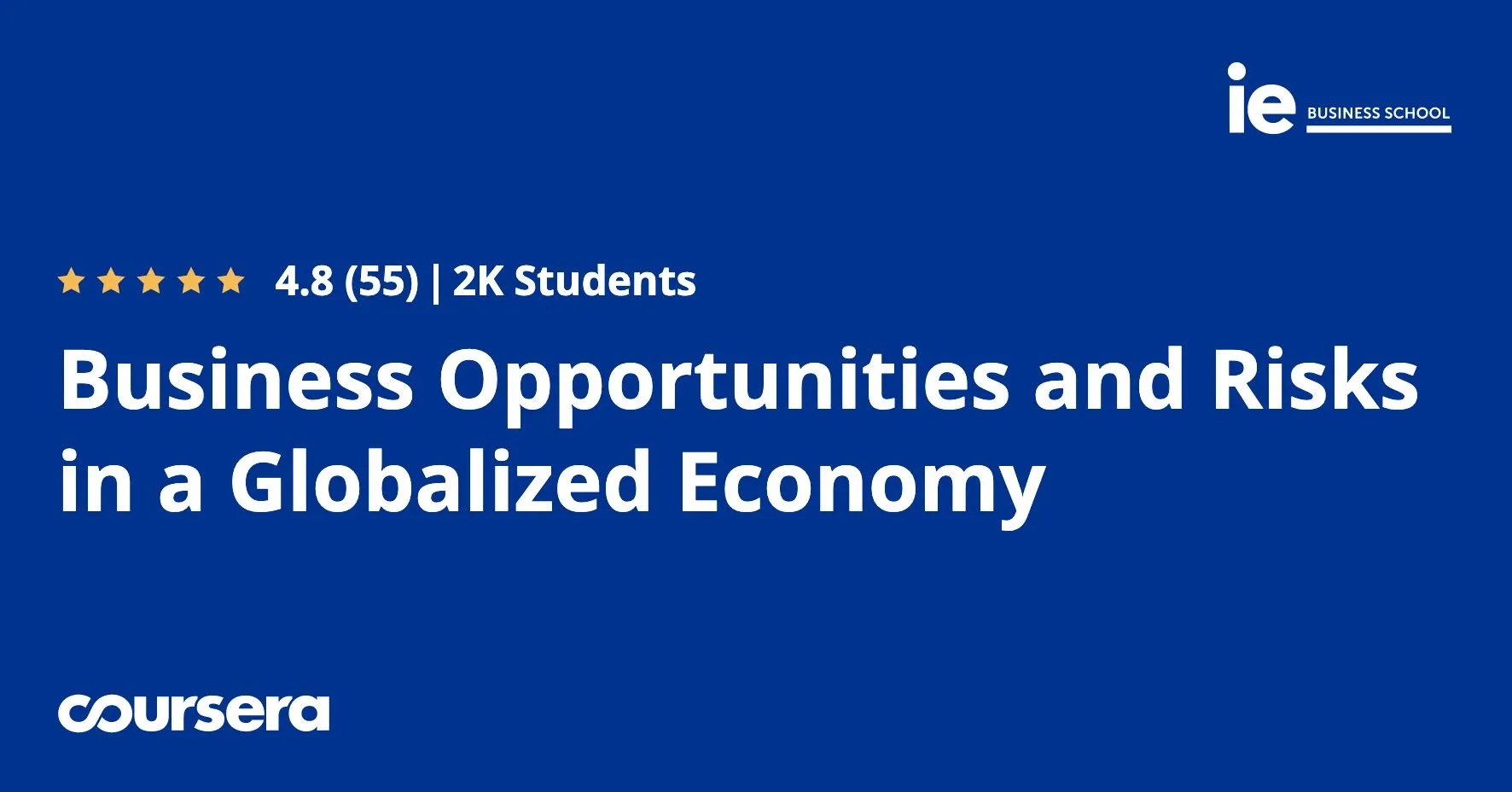
Business Opportunities and Risks in a Globalized Economy 
This course is the final part of the Globalization, Economic Growth and Stability Specialization, exploring the opportunities and risks of a globalized economy. It provides an in-depth look at the implications of globalization for businesses. ▼
ADVERTISEMENT
Course Feature
![]() Cost:
Cost:
Free
![]() Provider:
Provider:
Coursera
![]() Certificate:
Certificate:
No Information
![]() Language:
Language:
English
![]() Start Date:
Start Date:
Self Paced
Course Overview
❗The content presented here is sourced directly from Coursera platform. For comprehensive course details, including enrollment information, simply click on the 'Go to class' link on our website.
Updated in [March 06th, 2023]
This course, Business Opportunities and Risks in a Globalized Economy, is designed to help investors, businesspeople, and economists approach macroeconomic, institutional, and international data and derive information from the indicators that point to the types of opportunities and risks they present. Students will gain practice by handling the data of some of the largest economies in the world –the United States, Japan, the European Union, China and India—and “reading the story” of their economies from their data, yielding surprisingly profound conclusions about their present and future. This course is the third in a series for the specialization but it is also a stand-alone course for anyone who wants practice in practical macroeconomics.
[Applications]
Upon completion of this course, students should be able to apply the knowledge and skills acquired to identify business opportunities and risks in a globalized economy. They should be able to analyze macroeconomic, institutional and international data to identify trends and patterns that can be used to inform decisions. Additionally, they should be able to use the data to make predictions about the future of the global economy.
[Career Paths]
1. International Business Consultant: International business consultants help companies navigate the complexities of doing business in a globalized economy. They provide advice on how to best manage international operations, including market entry strategies, international trade regulations, and foreign exchange risk management. As the global economy continues to expand, the demand for international business consultants is expected to grow.
2. International Trade Analyst: International trade analysts are responsible for researching and analyzing global markets and trends in order to identify potential opportunities for their organization. They must be knowledgeable about international trade regulations and be able to interpret and analyze data from various sources. As the global economy continues to grow, the demand for international trade analysts is expected to increase.
3. International Investment Banker: International investment bankers provide financial advice and services to companies and governments in order to facilitate international investments. They must be knowledgeable about international markets and regulations, and be able to identify and analyze potential investment opportunities. As the global economy continues to expand, the demand for international investment bankers is expected to grow.
4. International Tax Accountant: International tax accountants are responsible for helping companies and individuals comply with international tax laws and regulations. They must be knowledgeable about international tax laws and be able to interpret and analyze data from various sources. As the global economy continues to expand, the demand for international tax accountants is expected to increase.
[Education Paths]
1. Bachelor of Business Administration: This degree program provides students with a comprehensive understanding of business principles and practices, including accounting, finance, marketing, and management. It also covers topics such as economics, international business, and business law. This degree is becoming increasingly popular as businesses become more globalized and require employees with a broad understanding of the global economy.
2. Master of Science in Economics: This degree program focuses on the study of economic theory and its application to the global economy. Students learn to analyze economic data and develop strategies to address economic issues. This degree is becoming increasingly important as businesses become more globalized and require employees with a deep understanding of the global economy.
3. Master of Science in International Business: This degree program focuses on the study of international business and its impact on the global economy. Students learn to analyze international business data and develop strategies to address global economic issues. This degree is becoming increasingly important as businesses become more globalized and require employees with a deep understanding of the global economy.
4. Master of Science in Global Finance: This degree program focuses on the study of global finance and its impact on the global economy. Students learn to analyze global financial data and develop strategies to address global economic issues. This degree is becoming increasingly important as businesses become more globalized and require employees with a deep understanding of the global economy.
Pros & Cons

Relevant to news of the day, Informative and detailed, Understand different economies, Applied policies during crisis and surplus, Phenomenal course, Easy to follow for noneconomists, Insightful knowledge and expertise.

Second specialisation of trade and immigration could have been more rigorous.
Course Provider

Provider Coursera's Stats at AZClass
Business Opportunities and Risks in a Globalized Economy gives learners the opportunity to gain a comprehensive understanding of the business opportunities and risks posed by a globalized economy. Learners will develop an understanding of macroeconomic, institutional and international data that can be used to identify potential opportunities and risks. They will also practice analyzing data from some of the largest economies in the world such as the US, Japan, EU, China and India to gain insight into their present and future. In addition, learners will understand the impact of globalization on economic growth, international trade and global markets. This course is ideal for investors, businessmen, economists and anyone interested in gaining a better understanding of the opportunities and risks posed by a globalized economy.
Discussion and Reviews
0.0 (Based on 0 reviews)
Explore Similar Online Courses

Time Management Tips

R ggplot and Simple Linear Regression

Python for Informatics: Exploring Information

Social Network Analysis

Introduction to Systematic Review and Meta-Analysis

The Analytics Edge

DCO042 - Python For Informatics

Causal Diagrams: Draw Your Assumptions Before Your Conclusions

Whole genome sequencing of bacterial genomes - tools and applications

Econ 101: The Complete Intro to Economics For Beginners

Economics: Elasticity and its Business Aspect on Pricing


Start your review of Business Opportunities and Risks in a Globalized Economy